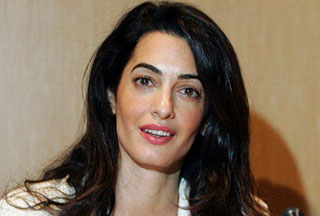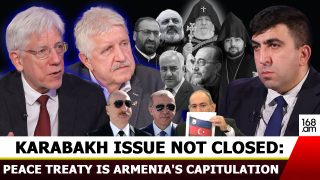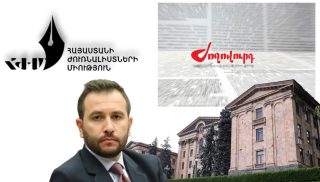Amal Clooney Takes on Armenian Case Protection in the European Court of Human Rights

Amal Clooney, a prominent international and human rights expert, George Clooney’s wife, has taken on the protection of the Armenian side in the “case of Doğu Perinçek,” The Telegraph reports.
Doğu Perinçek, a representative of the Left-wing Turkish Workers’ Party, was found guilty by the Swiss court during a visit to Switzerland in 2008 for denying the fact of the Armenian Genocide 1915, perpetrated by the government of Ottoman Empire with a plan of exterminating the whole Armenian race (as it was later described by New York Times). During his visit to Switzerland, Doğu Perinçek called the Armenian Genocide 1915 “an international lie” and was fined by the Swiss court for denial.
Doğu Perinçek appealed the Swiss court’s decision to the European Court of Human Rights (ECHR), which ruled that the Swiss court had violated the right of free expression.
The ECHR’s ruling is challenged by the Armenian party. The case will be heard in Strasbourg by ECHR. The first hearing is scheduled on January 28.
Amal Clooney will work in a team with Geoffrey Robertson, who wrote a book called “An Inconvenient Genocide: Who Now Remembers the Armenians?” Amal Clooney has been involved in high profile international cases, some of which include representation of the Wikileaks’ founder Julian Assange, as well as Yulia Timoshenko of Ukraine.
Among questions to be asked to the ECHR should be whether its decision is not a dual standard. If the ECHR determines and reaffirms that the Swiss Courts’ decisions have limited the right of free expression, this will result in a strong case law and precedent that can be used to combat strict limitation on freedom of expression by the Turkish government through its Article 301, which limits not only recognition of the Armenian genocide by individuals inside Turkey but has even strictly controlled public opinion in relation to this matter (however, it cannot stop future criminalization and punishment for genocide denial).
In fact, Doğu Perinçek can be found guilty for perpetrating/an attempt of genocide through denial. The Genocide Watch establishes that the 8 stages of genocide, commonly adopted and used by scholars and historians, include: 1. Classification (of culture as “them and us”); 2. Symbolization (giving names to a national group such as the “Jews” or “Gypsies”); 3. Dehumanization (when one group denies the humanity of another); 4. Organization (planned by a party such as a state); 5. Polarization (extremists drive the groups apart); 6. Preparation (victims are identified based on their religious or ethnic identity); 7. Extermination (massacres start and turn into a mass killing legally called a “genocide”); and 8. DENIAL (which is a stage that always follows a genocide).
According to the classification above, Doğu Perinçek committed a genocide / genocidal act through denial.
Another precedent the ECHR shall take into account is the fact that negating the Holocaust, a horrible crime against humanity and a genocide that followed the first genocide of the 20th century (the Armenian Genocide 1915) and took the lives of six million Jews, is a punishable offense in many countries. The ECHR should be prepared to answer the question what makes the Armenian case different. Is there any step out of the eight steps of genocide described above that does not exist in the Armenian case? Or, maybe because we are “ARMENIANS”?
Nowadays different pro-government groups in Turkey are discussing the possibility of granting diplomatic immunity to Doğu Perinçek, obviously understanding that this is a case that they are going to lose, and they will have to be prepared to protect their official.
Likewise, Turkey granted diplomatic immunity to Egemen Bagis, its EU Minister, to protect from potential liability stemming out of an investigation by Zurich prosecutors after genocide denial comments by Egemen Bagis at the World Economic Forum in Davos in January 2012, which were found as a violation by the anti-racism legislation of Switzerland.
The two cases are very similar, and a question the ECHR should be asked is how many more officials are going to be “saved” by Turkey through giving diplomatic immunity after a crime/violation is made, and whether it can be viewed as retrospective and be applied for the time when the real violation/crime was made.
P.S. The editorial team of 168 Hours newspaper will closely follow how the case unfolds and will publish more news on the case of “Perinçek v. Switzerland.”
By Kamo Mailyan
January 14, 2015
























